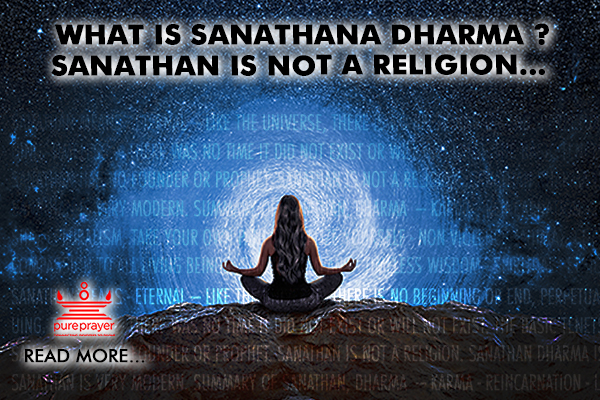Sanatan Dharma – A Personal journey for Self-Discovery
Sanatan Dharma, often referred to as the Hindu religion or Hinduism, is a practice that is more than just a religion; it is a way of life that has thrived for ages unknown. Rooted in the ancient wisdom of the Bharatavarsha, the ancient India, the term “Sanatan” itself holds profound significance.
PurePrayer invites everyone to embark on a personal journey of Sanatan Dharma for self-discovery, leading to spiritual growth, ethical living, and the ultimate pursuit of liberation. In a rapidly changing world, the eternal wisdom of Sanatan Dharma continues to guide seekers toward higher consciousness and a deeper understanding of the eternal truths that govern existence.
Sanatan: The Eternal and Timeless
The word “Sanatan” is derived from Vedic Language Sanskrit. It translates to “eternal,” “perpetual,” or “timeless.” This term encapsulates the core essence of Sanatan Dharma. It signifies a spiritual path that transcends time and is applicable across ages and eras. Unlike most organized religions, Sanatan Dharma is not confined to a single founder, scripture, or dogma, making it truly eternal and adaptable to evolving human needs.
Sanatan Dharma vs Religion
No Single Founder
Sanatan Dharma has no single founder or prophet. It is a collective body of spiritual knowledge that has evolved over millennia through the insights, experiences, and teachings of numerous sages, seers, and philosophers. It encourages individual seekers to explore spiritual truths independently and adapt them to their personal journey.
Dynamic and Evolving
Sanatan Dharma is not frozen in time but continues to evolve and adapt to changing circumstances. It acknowledges the importance of flexibility and innovation in spiritual exploration.
Basic Tenets of Sanatan Dharma
Dharma (Righteousness)
Dharma emphasizes living a life of virtue, honesty, and integrity while fulfilling one’s duties and responsibilities. It is the moral and ethical foundation of Sanatan Dharma.
Karma (Action and Consequence)
Karma signifies the law of cause and effect. It teaches that every action has consequences, and individuals are bound by the results of their deeds. By performing one’s duties selflessly, one can attain spiritual growth.
Reincarnation and Rebirth
Sanatan Dharma believes in the cycle of birth, death, and rebirth (samsara). The atman (soul) is eternal and undergoes multiple lifetimes until it attains liberation (moksha) from this cycle.
Moksha (Liberation)
Moksha is the ultimate goal of Sanatan Dharma and liberation from the cycle of staying in the worldly matters better known as ‘Samsara’. It is achieved through self-realization, spiritual knowledge, and union with the divine.
What the Sacred Texts State About Sanathan Dharma?
। ब्रह्म सत्यं जगन्मिथ्या जीवो ब्रह्मैव नापरः।
Meaning:
Brahma(n) is true, and this world is an illusion. The sentient self is Brahman, nothing else. Source: Brahma jnanavali mala
।। सत्यं सत्सु सदा धर्मः सत्यं धर्म सनातनः।
। सत्यमेव नमस्येत सत्यं हि परमा गतिः॥
Meaning:
Truth is indeed the eternal righteousness among the virtuous. Truth alone should be revered, for it is the ultimate goal. Source: Mahabharata – Shanti Parva
॥ जीवन्तं मृतवन्मन्ये देहिनं धर्मवर्जितम् ।
। मृतो धर्मेण संयुक्तो दीर्घजीवी न संशयः॥
Meaning:
One who is devoid of dharma, I consider them to be dead even when they are living; one who is endowed with dharma, such indeed live long, even when they are dead.
Source: Chanakya Niti
॥ ऐश्वर्यस्य विभूषणं सुजनता शौर्यस्य वाक्संयमो।
। ज्ञानस्योपशमः श्रुतस्य विनयो वित्तस्य पात्रे व्ययः॥
Meaning:
Benevolence is the ornament of wealth; restraint over speech, of valour; calmness, of knowledge; humility, of fame; appropriate spending, of wealth; control of one’s anger, of penance; forgiveness, of power; and honesty, of dharma. Good conduct is the base for all the above qualities and is the greatest ornament of all. Source: Niti Shatakam
॥ धर्म एव हतो हन्ति धर्मो रक्षति रक्षितः।
। तस्माद्धर्मो न हन्तव्यो मा नो धर्मो हतोऽवधीत्॥
Meaning:
Vitiated dharma vitiates. Protected dharma protects. Therefore dharma must not be vitiated, lest vitiated dharma vitiate us. Source: Yaksha Prashna in Mahabharata
राज्यं दास्ये न देवेभ्यो वीरभोग्या वसुंधरा।
क्ञ्रणं दास्यामि ते रुद्र देवानां पार्टिसिने॥
Meaning:
Shaṅkhachuḍa said, “I will not return this kingdom to the gods as this earth belongs to great warriors. Oh Shiva! I’ll fight you for your partial behaviour towards Devatas.
Source: Shiva Purana
यदा यदा हि धर्मस्य ग्लानिर्भवति भारत।
अभ्युत्थानमधर्मस्य तदात्मानं सृजाम्यहम्॥
Meaning:
Whenever there is a decline in righteousness and an increase in unrighteousness, oh Arjuna, I manifest myself. Source: Bhagavad Gita
|| देवः देशः धर्मः ||
Meaning: God, Country, Religion
PurePrayer is a leading online platform offering Purohit Services of experienced and Vedic Pandits in all the Metro Cities of India like Chennai, Delhi, Gurugram, Hyderabad, Kolkata, Mumbai, Mysuru, Pune and many others as well as in Teertha Kshetras across India. We provide the services of Bengali Pandits, Hindi Pandits, Kannada Poojaris, Kashmiri Pandits, North Indian Pandits, Tamil Vadhyars, Telugu Purohits, Marathi Guruji, Malayalam Pandits, Oriya Pandits and many more. Pandits are available in Offline or Remote support format.
Please visit www.pureprayer.com or call us on +91 8151002255, WA No: +91 9606036988 to learn more about booking online Pandits/Purohits for all Pujas, Havans and many more.
|| सत्यमेव जयते ||
|| सनातनमेव जयते ||


Leave a review